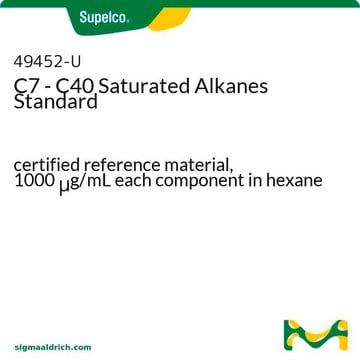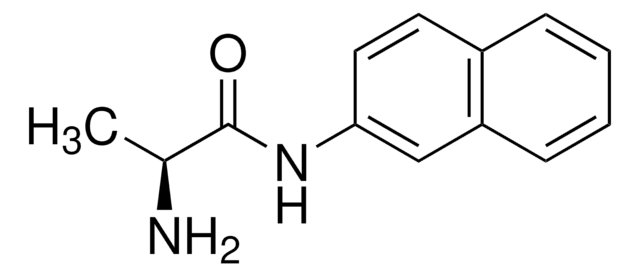74691
Octadecane
analytical standard
About This Item
Produits recommandés
Qualité
analytical standard
Niveau de qualité
Densité de vapeur
8.8 (vs air)
Pression de vapeur
1 mmHg ( 119 °C)
Pureté
≥98.5% (GC)
Température d'inflammation spontanée
455 °F
Durée de conservation
limited shelf life, expiry date on the label
Technique(s)
HPLC: suitable
gas chromatography (GC): suitable
Point d'ébullition
317 °C (lit.)
Pf
26-29 °C (lit.)
28-30 °C
Densité
0.777 g/mL at 25 °C (lit.)
Application(s)
petroleum
Format
neat
Chaîne SMILES
CCCCCCCCCCCCCCCCCC
InChI
1S/C18H38/c1-3-5-7-9-11-13-15-17-18-16-14-12-10-8-6-4-2/h3-18H2,1-2H3
Clé InChI
RZJRJXONCZWCBN-UHFFFAOYSA-N
Vous recherchez des produits similaires ? Visite Guide de comparaison des produits
Application
Octadecane may be used as an analytical reference standard for the determination of the analyte from hot-pressing of mixed-hardwood particleboard using chromatography techniques. It may be used as an internal standard to study the analysis of fatty acid composition of plasma glycerophospholipids using gas chromatography with flame ionization detection.
Mention d'avertissement
Danger
Mentions de danger
Conseils de prudence
Classification des risques
Asp. Tox. 1
Code de la classe de stockage
10 - Combustible liquids
Classe de danger pour l'eau (WGK)
WGK 3
Point d'éclair (°F)
330.8 °F - closed cup
Point d'éclair (°C)
166 °C - closed cup
Équipement de protection individuelle
dust mask type N95 (US), Eyeshields, Gloves
Faites votre choix parmi les versions les plus récentes :
Déjà en possession de ce produit ?
Retrouvez la documentation relative aux produits que vous avez récemment achetés dans la Bibliothèque de documents.
Les clients ont également consulté
Protocoles
Separation of Decane; Dodecane; Tetradecane; Hexadecane; Octadecane; Eicosane; Docosane; Tetracosane; Hexacosane; Octacosane
Notre équipe de scientifiques dispose d'une expérience dans tous les secteurs de la recherche, notamment en sciences de la vie, science des matériaux, synthèse chimique, chromatographie, analyse et dans de nombreux autres domaines..
Contacter notre Service technique











